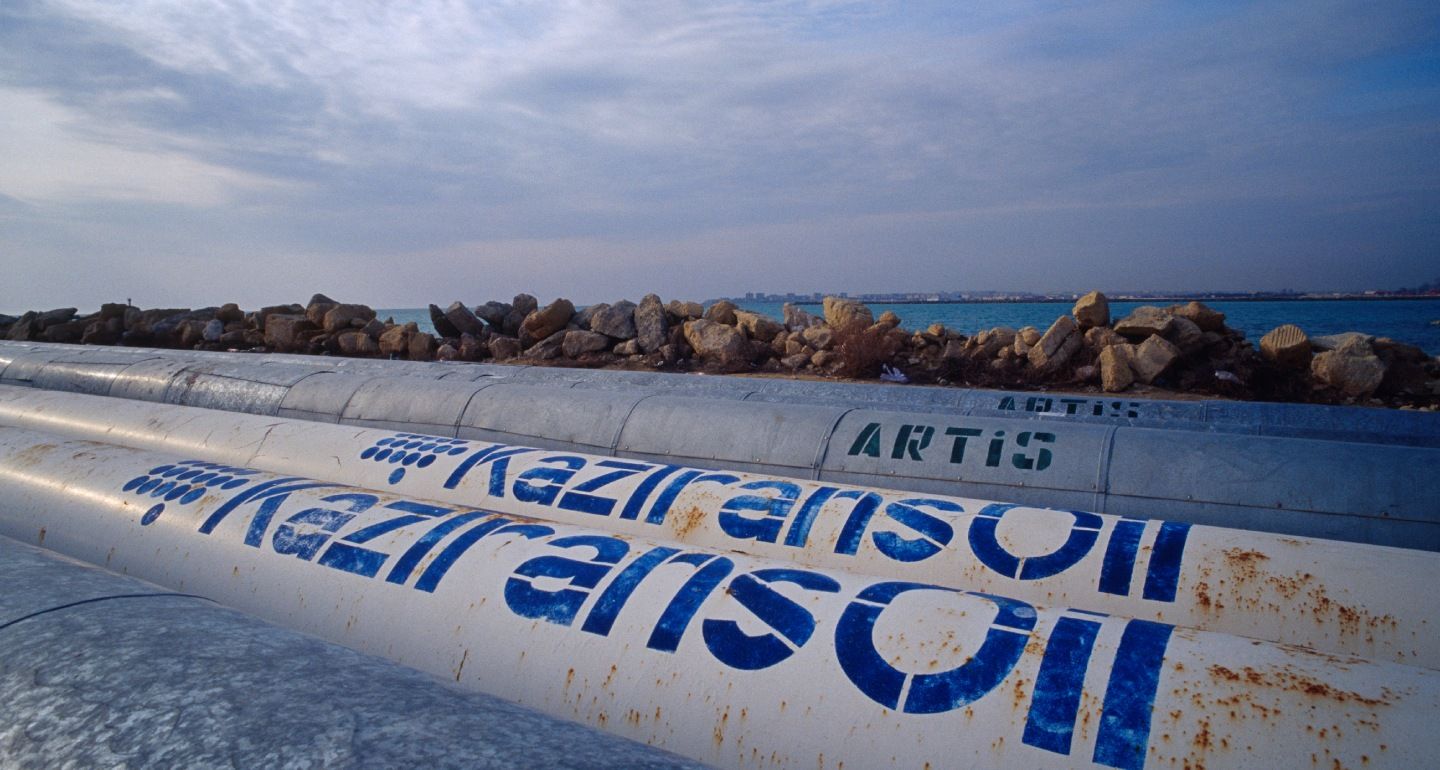Despite its reputation as an island of democracy in Central Asia, Kyrgyzstan appears to be on the brink of becoming a personalist autocracy.
Temur Umarov
{
"authors": [
"Rassul Kospanov"
],
"type": "commentary",
"blog": "Carnegie Politika",
"centerAffiliationAll": "",
"centers": [
"Carnegie Endowment for International Peace",
"Carnegie Russia Eurasia Center"
],
"englishNewsletterAll": "",
"nonEnglishNewsletterAll": "",
"primaryCenter": "Carnegie Russia Eurasia Center",
"programAffiliation": "",
"programs": [],
"projects": [],
"regions": [
"Kazakhstan",
"Central Asia"
],
"topics": [
"Trade",
"Economy",
"Energy",
"Climate Change"
]
}
Source: Getty
If Kazakhstan does not start revising the terms of its oil agreements now, by 2040 it risks finding itself in a situation where its largest deposits have been depleted and no new ways of replenishing the budget have materialized.
At the start of this year, Kazakhstan’s average daily oil production hit a record of over 2.03 million barrels per day. Yet for the country’s leadership, this was not so much a cause for celebration as another reminder of the imminent need for serious changes to the oil industry. The Kazakh budget deficit has been growing steadily since 2020, and last year reached 3 percent of GDP. Meanwhile, Western oil giants receive up to 98 percent of the revenue from some Kazakh fields under contracts dating back to the 1990s.
Almost two-thirds of all hydrocarbon production in Kazakhstan comes from just three oil and gas fields: Tengiz, Karachaganak, and Kashagan. They were discovered back in Soviet times, but their development only became possible thanks to production-sharing agreements entered into with Western oil companies in the 1990s. In the early years of its independence, Kazakhstan signed several agreements—with Chevron, Eni, Shell, ExxonMobil, and other companies—that remain in force through to the late 2030s. Those agreements have enabled the country to raise tens of billions of dollars in investment, create hundreds of thousands of jobs, and gain access to advanced technology.
About $50 billion was invested in the development of Kashagan, $27 billion in Karachaganak, and almost $48 billion in the expansion of Tengiz. Without these investments, it’s unlikely that Kazakhstan would have become one of the world’s largest oil producers, currently producing 100 million tons per year.
However, these generous investments also had a downside. The young and institutionally weak state had to provide investors with extremely favorable working conditions: tax breaks, long payback periods, and confidential commercial provisions. As a result, in the first few years of the fields’ development, the share of profits received by the state was insignificant.
Kazakhstan’s 1990s leadership effectively laid the foundations for the country’s oil and gas sector on terms dictated by the oil giants. Many of those contracts remain confidential to this day, to the point that it is unknown exactly what share of oil revenues the state receives.
Unsurprisingly, there are concerns in Kazakhstan over how equitable the distribution of oil revenues is. In 2003, the U.S. businessman James Giffen, who had worked for many years as an adviser to then president Nursultan Nazarbayev, was arrested in New York. He was accused by the U.S. government of paying $78 million in bribes to senior Kazakh officials, including Nazarbayev himself and then prime minister Nurlan Balgimbayev, in exchange for lucrative contracts at the Tengiz oil field. Giffen claimed that he had acted with CIA approval, and the charges against him were ultimately dropped, but in Kazakhstan itself, suspicions remain over the oil deals of the 1990s.
Kazakhstan has long been paving the way for the renegotiation of those oil deals. In 2008, the North Caspian Operating Company(NCOC) that is developing Kashagan and includes Shell, ExxonMobil, Eni, TotalEnergies, CNPC, and Inpex, agreed to increase the stake of Kazakhstan’s KazMunayGas to 16.88 percent and paid compensation for the delay in launching the field. Then, in 2012, the government secured a 10 percent stake for KazMunayGas in Karachaganak.
Since the departure of Nazarbayev from the political scene in 2022, along with the previous generation of elites, there has been a surge in claims against foreign corporations. In 2023, the Kazakh government initiated a $13 billion lawsuit against NCOC, demanding that “unauthorized expenses” for 2010–2018 be excluded from reimbursable expenses since the project was many years behind schedule. In 2024, the amount being claimed increased to $160 billion, in addition to claims for lost profits. For comparison, Kazakhstan’s entire GDP in 2024 was $288 billion.
At the same time, the authorities began to make environmental claims. Kazakhstan imposed a $5.1 billion fine on Kashagan’s operators for various violations, and arbitration proceedings are still ongoing. Kazakhstan has also filed a $3.5 billion environmental lawsuit against the KPO consortium that manages the development of the Karachaganak field.
The Tengizchevroil (TCO) consortium, which comprises Chevron, ExxonMobil, KazMunayGas, and Lukoil, remains the only one of the “big three” against which Kazakhstan has not yet filed any significant lawsuits. But even that situation appears to be changing: on February 13, TCO CEO Kevin Lyon was invited to parliament: the first time that anyone from the management of the oil giants had had to report to Kazakh deputies and listen to their criticism.
In parallel, Kazakh Energy Minister Almassadam Satkaliyev met with the head of Chevron and the vice president of ExxonMobil. And in April, Chevron CEO Mike Wirth arrived in Astana to meet with President Kassym-Jomart Tokayev and Prime Minister Olzhas Bektenov.
Public statements by the Kazakh leadership also provide ample indication that the country is seeking a moderate revision of the terms of its cooperation with oil giants. Speaking at a broader government meeting on January 28, Tokayev said that production-sharing agreements had played an important role in their time in the development of the industry, but now need updating on more favorable terms for the country. He also called for the start of negotiations to extend the contracts.
Satkaliyev subsequently admitted for the first time that Kazakhstan was preparing to revise the parameters of the old production-sharing agreements, starting with the Tengiz project. He named increasing Kazakhstan’s share, changing the operators, and improving the terms of the contracts as key topics in the negotiations.
There may be no better time than the present to tackle these changes. First of all, a new generation of elites has come to power within the Kazakh government in the past few years who have nothing to do with the compromises made in the 1990s. For them, revising approaches to the use of mineral resources is not only a question of state revenue, but also proof of their political agency and ability to shore up the country’s economic sovereignty.
There is also growing demand in Kazakh society for a more transparent and fair distribution of resource rent. In 2022, a public petition appeared online demanding the declassification of the terms of production-sharing agreements and disclosure of how revenues are divided between the state budget and foreign companies. Public opinion is far from always the main factor in decision-making in Kazakhstan, but it is becoming increasingly difficult to ignore.
The geoeconomic landscape is also changing. Sanctions, trade wars, and the instability of transport routes have dramatically changed the conditions for exporting Kazakh oil, which also requires a corresponding revision of old agreements—especially at a time when the war in Ukraine is pushing the West to pay more attention to the countries of Central Asia.
Finally, if Kazakhstan does not start revising its oil agreements now, by 2040 it risks finding itself in a situation where the largest deposits have been depleted but no new ways of replenishing the budget have materialized. Of course, taking on the world’s largest energy corporations is no mean feat, but if Kazakhstan doesn’t take advantage of the favorable climate right now to secure better conditions for itself, the next opportunity may be a long time coming.

Rassul Kospanov
Political scientist, specializes on Kazakhstan's domestic and foreign policies
Carnegie does not take institutional positions on public policy issues; the views represented herein are those of the author(s) and do not necessarily reflect the views of Carnegie, its staff, or its trustees.
Despite its reputation as an island of democracy in Central Asia, Kyrgyzstan appears to be on the brink of becoming a personalist autocracy.

Temur Umarov
The Russian army is not currently struggling to recruit new contract soldiers, though the number of people willing to go to war for money is dwindling.

Dmitry Kuznets
Having failed to build a team that he can fully trust or establish strong state institutions, Mirziyoyev has become reliant on his family.

Galiya Ibragimova
What should happen when sanctions designed to weaken the Belarusian regime end up enriching and strengthening the Kremlin?

Denis Kishinevsky
Geological complexity and years of mismanagement mean the Venezuelan oil industry is not the big prize officials in Moscow and Washington appear to believe.

Sergey Vakulenko